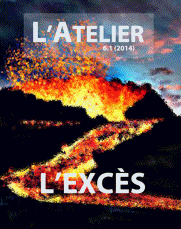Musique rap et rhétorique de l'excès
Keywords:
Musique rap, Excès, OralitéAbstract
Cet article examine l'exagération qui accompagne invariablement les récits bigger-than-life des rappeurs. Alors que certains chercheurs ont vu dans leur propension à l’hyperbole une dimension réactive et un déterminisme « naturel », nous privilégierons plutôt ici une approche anthropologique en remontant aux origines du rap comme pratique socioculturelle. Cette sociogenèse nous permettra de nous pencher en premier lieu sur le caractère résolument agonistique de la musique rap. Nous montrerons ainsi que la logique antagoniste et la contrainte de surenchère imposées par des conventions tacites exigent un recours conventionnel à une rhétorique de l’excès où aucune corrélation entre la parole et les actes n’est toutefois requise et où le rappeur n’a aucune obligation d’accorder ses actes à ses dires.
Nous verrons ensuite que les rimes exagérées des rappeurs, rimes dont la teneur suscite fréquemment une forte réprobation sociale, viennent renforcer des pratiques rhétoriques plus anciennes où l’hyperbole est un outil tout aussi omniprésent.
This article examines the ritual exaggeration that characterizes the bigger-than-life lyrics of rap emcees. It traces it back to the early days of rap music as a musical and rhetorical expressive form. In a first part it highlights rap music’s spirit of competition (âgon) and explains to what extent rap musicians heavily rely on metaphors and hyperboles to impress their competition and audience. It then demonstrates how rappers, in the formative years of rap music, parochially adjusted the themes and narrative structures of longstanding oral narratives and heroic tales, using the same excessive stylized discourse and hyperbolic language
Published
Issue
Section
License
- Work submitted for publication must be original, previously unpublished, and not under consideration for publication elsewhere. If previously published figures, tables, or parts of text are to be included, the copyright-holder's permission must have been obtained prior to submission.
- Authors of accepted manuscripts will assign to L'Atelier the right to electronically distribute their article, or publish it in any form (Internet, CD ROM, printed copy) but authors will retain copyright and, after the article has appeared in L'Atelier, authors may republish their text (in print and/or electronic form) as long as they clearly acknowledge L'Atelier as the original publisher.


